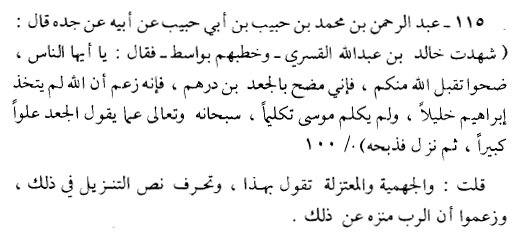
'Abdur-Rahmaan bin Muhammad bin Habeeb bin Abee Habeeb on the authority of his father, on the authority of his grandfather [who] said:

I witnessed Khaaid bin 'Abdullah al-Qasree - and he addressed them at Waasit - "Oh People, make sacrifice, may Allah accept it from you. Verily I am sacrificing al-Ja'd bin Dirham, for indeed he claims that Allah did not take Ibrahim as a khaleel (close friend), and [that] He did not speak to Moosa. Most Perfect is He and exalted is He from what al-Ja'd says." Then he descended and slaughtered him.
I say: And the Jahmiyyah and Mu'tazilah speak with this, and they distort the text of the revelation regarding that, and they claim that the Lord is purified of that [i.e. having spoken to Moses and taken Ibrahim as a khalil]
Source: "Mukhtasar al-Uluww" of adh-Dhahabi, (p. 133).
Note: The reason for al-Ja'd's rejection (and likewise that of al-Jahm bin Safwan) of Allaah speaking to Moses and taking Ibrahim as a khalil is because these signify events and occurrences (hawaadith), which according to Aristotle's "al-Maqoolaat al-Ashar" (the Ten Categories) would make Allaah a body (jism). And since, the basic notions of Aristotelian Metaphysics were used as part of an intellectual proof to argue that the universe is created (as argument against the atheists), all speech regarding Allaah had to conform to this proof in the view of the Jahmiyyah and Mu'tazilah who were the pioneers of this proof - and thus, they started rejecting affairs such as these in the Book and the Sunnah, and included within this is their rejection that Allaah is above the Throne, above the Heaven.
Refer to the following articles for further elaboration:
And from this it becomes clear that the reason for their rejection that Allaah spoke to Moses direct, or that He took Ibrahim as a khalil, is the very same reason for which they rejected Allaah is above His creation, above the Throne. These are the same usool upon which the creed of the Ash'arites is built upon and their differences with the Mu'tazilah are only on subsidiary issues relating to what can and cannot be affirmed or denied for Allaah without invalidating this intellectual proof that they consider to be the base and foundation of the religion, the ultimate truth.

